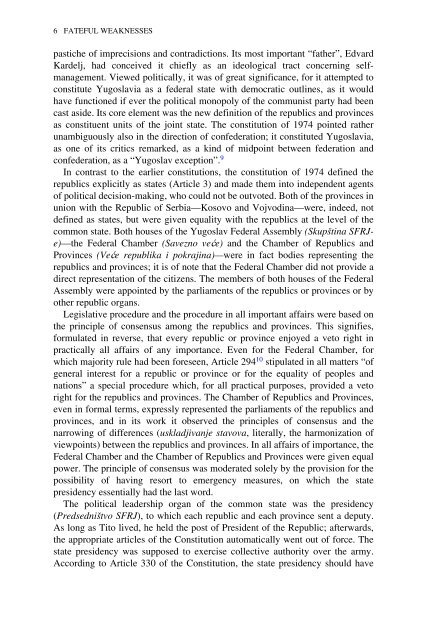Yugoslavia: A History of its Demise - Indymedia
Yugoslavia: A History of its Demise - Indymedia
Yugoslavia: A History of its Demise - Indymedia
You also want an ePaper? Increase the reach of your titles
YUMPU automatically turns print PDFs into web optimized ePapers that Google loves.
6 FATEFUL WEAKNESSES<br />
pastiche <strong>of</strong> imprecisions and contradictions. Its most important “father”, Edvard<br />
Kardelj, had conceived it chiefly as an ideological tract concerning selfmanagement.<br />
Viewed politically, it was <strong>of</strong> great significance, for it attempted to<br />
constitute <strong>Yugoslavia</strong> as a federal state with democratic outlines, as it would<br />
have functioned if ever the political monopoly <strong>of</strong> the communist party had been<br />
cast aside. Its core element was the new definition <strong>of</strong> the republics and provinces<br />
as constituent un<strong>its</strong> <strong>of</strong> the joint state. The constitution <strong>of</strong> 1974 pointed rather<br />
unambiguously also in the direction <strong>of</strong> confederation; it constituted <strong>Yugoslavia</strong>,<br />
as one <strong>of</strong> <strong>its</strong> critics remarked, as a kind <strong>of</strong> midpoint between federation and<br />
confederation, as a “Yugoslav exception”. 9<br />
In contrast to the earlier constitutions, the constitution <strong>of</strong> 1974 defined the<br />
republics explicitly as states (Article 3) and made them into independent agents<br />
<strong>of</strong> political decision-making, who could not be outvoted. Both <strong>of</strong> the provinces in<br />
union with the Republic <strong>of</strong> Serbia—Kosovo and Vojvodina—were, indeed, not<br />
defined as states, but were given equality with the republics at the level <strong>of</strong> the<br />
common state. Both houses <strong>of</strong> the Yugoslav Federal Assembly (Skupština SFRJe)—the<br />
Federal Chamber (Savezno veće) and the Chamber <strong>of</strong> Republics and<br />
Provinces (Veće republika i pokrajina)—were in fact bodies representing the<br />
republics and provinces; it is <strong>of</strong> note that the Federal Chamber did not provide a<br />
direct representation <strong>of</strong> the citizens. The members <strong>of</strong> both houses <strong>of</strong> the Federal<br />
Assembly were appointed by the parliaments <strong>of</strong> the republics or provinces or by<br />
other republic organs.<br />
Legislative procedure and the procedure in all important affairs were based on<br />
the principle <strong>of</strong> consensus among the republics and provinces. This signifies,<br />
formulated in reverse, that every republic or province enjoyed a veto right in<br />
practically all affairs <strong>of</strong> any importance. Even for the Federal Chamber, for<br />
which majority rule had been foreseen, Article 294 10 stipulated in all matters “<strong>of</strong><br />
general interest for a republic or province or for the equality <strong>of</strong> peoples and<br />
nations” a special procedure which, for all practical purposes, provided a veto<br />
right for the republics and provinces. The Chamber <strong>of</strong> Republics and Provinces,<br />
even in formal terms, expressly represented the parliaments <strong>of</strong> the republics and<br />
provinces, and in <strong>its</strong> work it observed the principles <strong>of</strong> consensus and the<br />
narrowing <strong>of</strong> differences (uskladjivanje stavova, literally, the harmonization <strong>of</strong><br />
viewpoints) between the republics and provinces. In all affairs <strong>of</strong> importance, the<br />
Federal Chamber and the Chamber <strong>of</strong> Republics and Provinces were given equal<br />
power. The principle <strong>of</strong> consensus was moderated solely by the provision for the<br />
possibility <strong>of</strong> having resort to emergency measures, on which the state<br />
presidency essentially had the last word.<br />
The political leadership organ <strong>of</strong> the common state was the presidency<br />
(Predsedništvo SFRJ), to which each republic and each province sent a deputy.<br />
As long as Tito lived, he held the post <strong>of</strong> President <strong>of</strong> the Republic; afterwards,<br />
the appropriate articles <strong>of</strong> the Constitution automatically went out <strong>of</strong> force. The<br />
state presidency was supposed to exercise collective authority over the army.<br />
According to Article 330 <strong>of</strong> the Constitution, the state presidency should have
















